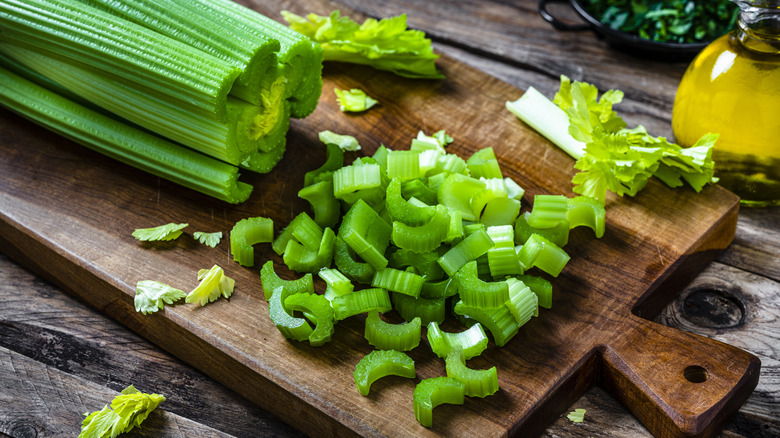Eating Celery Every Day Has An Unexpected Effect On Your Cholesterol
Veggie appetizer trays often have common staples such as carrots, broccoli, and celery to get some healthy nutrients into your body. Celery might also accompany buffalo wings to give you some crunch and turn down the heat. Celery makes a great filler for tuna salad or turkey stuffing without adding too many calories (No, celery doesn't have negative calories).
The calorie count in a half cup of celery is in the single digits — just 7 calories. Celery is also 96% water to help with hydration. You don't get as many nutrients in celery aside from a sprinkling of fiber, vitamin K, folate, and potassium, but snacking on celery is probably a better choice than high-sodium chips or sugary cookies. Celery also has specific compounds that can fight free radicals, reduce inflammation, and neutralize some acidic foods in your diet, such as processed meats, seafood, and dairy. A unique compound in celery might also be able to lower high cholesterol and triglycerides.
Celery's lipid-lowering compound
Researchers previously believed it was a compound called 3-n-butylphthalide that contributed to celery's cholesterol-lowering potential, according to an older article in Clinical and Experimental Pharmacology and Physiology. Rats with high cholesterol that were given celery extract had lowered their cholesterol levels. When the researchers isolated the 3-n-butylphthalide from the celery, it didn't have the same cholesterol-lowering effect.
In a 2010 article in the Journal of Agriculture and Food Chemistry, researchers isolated a compound found in essential oil in mountain celery seeds called oleamide, believing that it was the ingredient that could lower blood lipids. When they created this compound in the lab, they found that it lowered LDL cholesterol and triglycerides but didn't improve HDL cholesterol.
Combining celery with other heart-healthy foods might help reduce high cholesterol without medication, according to a 2011 study in Pharmacognosy Magazine. Celery, chicory, and barley were ground into powder and given to rats with high cholesterol. Individually, these foods lowered cholesterol, but the three combined at lower concentrations did a better job at reducing cholesterol and liver enzymes.
Other health benefits of celery
If you're trying to lower your blood pressure, try tossing several stalks of celery into a juicer. Celery has flavonoids, apiin, apigenin, calcium, and magnesium that can help lower your blood pressure. A 2021 study in the Journal of Health found that 10 people who drank celery juice reduced their systolic blood pressure on average by 30 millimeters of mercury (mmHg) and diastolic blood pressure by 14 mmHg. Clinical trials found that bioactive compounds such as 3-n-butylphthalide and apigenin help regulate blood pressure and lower heart rate, according to a 2024 review in the International Journal of Food Science.
Celery might also be a great supplement with Pilates to help you control your blood sugar, says a 2015 article in the International Medical Journal. Although the women who did Pilates for eight weeks lost weight and improved their body mass index (BMI), the women who took Pilates and a celery supplement had the highest levels of adiponectin in their system. Adiponectin is a hormone secreted by fat cells that increases insulin sensitivity to control blood sugar.



